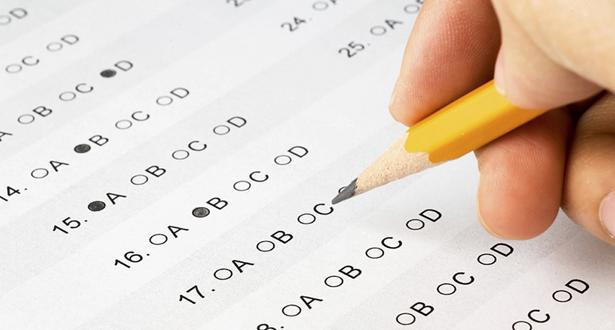The SATs: More trouble than they’re worth?
Hand completing a multiple choice exam.
February 4, 2016
Saturday, January 23 marked my first run-in with the SATs.
I awoke bright and early that morning, nearly the same time I’m required to force myself out of my tangle of bedsheets every morning before school. Much to my displeasure, the SATs were conducted far before the sun began to peek up from the horizon, and I spent my time getting ready, as well as the first hour or so of my testing period, in the darkness of morning.
Bracing the cold and the sludge covered roads I, as well as many of my peers, embarked on our way under the cruel conditions of that morning to prove our skills to a committee of individuals who, quite honestly, couldn’t care less whether we passed or failed.
To my great disadvantage, I had never taken any form of practice for the SATs. Prior to that morning, I had minimal knowledge of what I was truly getting myself into. Never had I sat through the five hours of practice-testing for the PSATs, listened to a teacher drone on and on through a lecture in an SAT prep class, or even cracked open a practice book in preparation. No, instead I entered the hallways of North Allegheny’s Senior High school completely blind to what was before me: five hours of grueling and relentless mind-picking that left me physically and emotionally drained.
As we sat amongst each other, a band of students varying in age and restlessness, we colored in circle after circle until each of us began to feel more machine than human. If not for those sparse and rushed five minute breaks every fifty-minute interval, I would likely have broken down. Mind you, these gracious five minutes were provided sparingly and hardly provided enough time for us to stuff our faces with a sufficient amount of trail mix to stifle our stomachs from crying out.
Through that five-hour long period of what I can only describe as agony, I often felt my mind begin to wander from the passage in front of me because the background noises of squeaky pencils and the choir of hungry stomachs growling. Off my mind raced until I was sitting upon that cold, hard desk chair wondering not about the far-too-advanced math problem before me, but instead of why I was even there.
Would this collection of filled in letters truly represent the extent of my intelligence? Would the employees at the SATs look upon my hasty scribbles and truly get a read of my character, work ethic and overall knowledge? I think it is safe to assume that despite the significant amount of answers I hurriedly completed, this form of assessment would never truly be able to register the extent of me as a person, or anyone else for that matter.
The SATs have been a form of standardized testing for over a decade. They were first introduced throughout the period of 1991-1998 and over time, colleges have adapted to making high SAT scores a priority for entry and registration. But the SATs are not the only form of standardized testing typically needed for a standard college application. Often SATs scores are suggested or even required by particular schools to be accompanied by the ACTs, in addition to the already tremendous amount of tests and grades that a student is required to present to the colleges of their choosing.
While the thought process behind standardized testing stems from good intentions, I do not believe it accomplishes what these suited government officials originally set out for. I understand that the SATs, as well as any other form of standardized assessment, are meant to quickly provide a brief overview of one’s basic abilities and knowledge. But once you’ve sat in the same chair for five hours straight, deprived of food, water and sleep, your capabilities begin to falter. Suddenly, the paper you’re staring at stops registering, and your mind, out of pure and utter fatigue, begins to scribble down answers for the sake of getting it over with.
Yet somehow, despite this, these two packets register as pure assessments of you, telling colleges what they believe to be the basis of your abilities. Even though it does measure you to a degree, the accuracy and legitimacy should be called into question before you’re represented by a string of numbers earned after a single morning’s worth of work. When juxtaposed to general report cards (which arguably provide better representation of your overall abilities over a span of four years) standardized testing begins to pale in comparison.
Do these companies, meant to pick and prod at children, take into consideration anything besides numerical representations? They appear more concerned with whether or not your admission ticket is forged than if your stomach is full and your body well-rested.
Perhaps this has come off as a bit too much like a rant and maybe it actually is. You could even go so far as to blame my poor testing experience on inexperience and my lack of prior understanding of what I was getting into.
Whatever your opinion may be, it’s likely this will fall upon deaf ears, regardless, and even more likely that my opinion will not change a thing. I’m just one voice of many who would rather have spent her Saturday morning snuggled up in bed rather than hunched over a desk, filling in the bubble to my three hundredth multiple choice question.
(photo provided by www.theatlantic.com)

